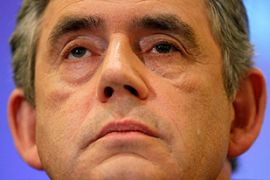UK prioritises Afghan self-security
PM says that UK military will not leave Afghanistan until Afghans can secure country.

Brown said that the UK’s strategy in the southern Helmand province was short-term securitisation, mid-term “Afghanisation” of their work and longer-term development.
He said that the strategy for the 9,000 UK troops was targeting urban and rural areas, many heavily populated.
“This is a strategy radically different from all previous foreign interventions in Afghanistan, which lacked the support of the population, which stayed in the cities and ignored the country and did not seek to empower Afghans themselves in maintaining security.”
‘Continued threat’
Brown also asserted that forces in Afghanistan, which al-Qaeda sees as strategically important in establishing a pan-Islamic caliphate, and Pakistan continued to pose the biggest threat to UK national security.
| in depth |
|
UK official quits over war US trapped in ‘bitter war’? On the frontlines with US troops Interview with chairman of the US joint chiefs of staff |
“The main element of the threat to the UK continues to emanate from al-Qaeda and [groups in] Pakistan.”
“[Therefore,] a safer Afghanistan means a safer Britain. It is on this basis that I made clear in the spring … that preventing terrorism coming to the streets of Britain, America and other countries, depends on strengthening the authorities in both Pakistan and Afghanistan to defeat al-Qaeda and the Pakistan and Afghan Taliban.”
He said that missions this year had brought successes in central and southern Helmand, in the south of the country. However, he added that other nations in Nato needed to ask whether they were doing enough to help in Afghanistan.
On last month’s Afghan elections, Brown said that turnout was not as high as hoped and accusations of voting irregularities needed to be independently investigated.
“But the very fact of the first elections run by Afghans themselves is an important step forward for the people of Afghanistan. And we should remember that the Taliban vowed to destroy this election and they failed.”
Political initiative
Chrispian Cuss, former British military spokesman in Iraq, told Al Jazeera that Brown had defined success as when the Afghans are capable of looking after their own security.
“There was nothing about democratic process, nothing about economic reconstruction … So you want to ask him was that why we went there in the first place?
“But, for the first time, you heard the British government state why we are there. And it was about the threat from al-Qaeda, Islamic extremism and the threat it poses to the British streets.”
|
“Brown has been shown to be doing very badly in the polls over his handling of the war in Afghanistan” Chrispian Cuss, former British military spokesman in Iraq |
Cuss also said that Brown again did not give a timeframe for the mission, which the UK public would want to know, and whether the US had asked for more British troops in Afghanistan in recent meetings, which is suspected.
“Brown has been shown to be doing very badly in the polls over his handling of the war in Afghanistan and he’s really trying to make a great effort to regain the political initiative.
“The problem is this is a very, very complicated operation. It is tied in not only with Afghanistan’s future, but also Pakistan’s and the region as a whole.
“He’s going to have tremendous difficulty over the next few months selling this to the British public.”
Anthony Howard, a political commentator, said: “I think that people just don’t accept that a safer Afghanistan makes a safer Britain. That may have washed at the very beginning, but now the body bags are coming back … people are saying that it just isn’t working.
“They see that maybe that we’re engaged in an act of provocation in Afghanistan. Far from making terrorism less likely, it might make it more likely, because they are enraged by what is happening in Afghanistan.”
Brown’s comments came a day after an aide to the defence minister resigned, citing problems with the handling of the war in Afghanistan.
British troop numbers in Afghanistan are currently at their highest level – 9,150 – since the military entered the country in 2001 with the US to remove the Taliban from power.
